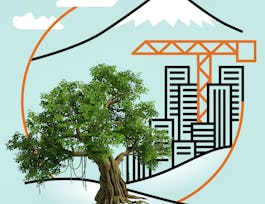The course focuses on contemporary urban planning issues, particularly the Garden City concept, addressing the global trend of integrating green spaces into cities to combat environmental challenges.



Détails à connaître

Ajouter à votre profil LinkedIn
août 2024
6 devoirs
Découvrez comment les employés des entreprises prestigieuses maîtrisent des compétences recherchées


Obtenez un certificat professionnel
Ajoutez cette qualification à votre profil LinkedIn ou à votre CV
Partagez-le sur les réseaux sociaux et dans votre évaluation de performance

Il y a 11 modules dans ce cours
Welcome to the Coursera! Dear Students, Welcome to “Contemporary Garden City Concept from Asia”! When you start the course, please take a few minutes to fill out our pre-course survey in this section. This helps us understand who you are so that we can accommodate you in the best way possible. Thank you for your cooperation. We hope to create a great learning community where we can learn from one another. Please post your questions and thoughts and exchange views on the course topics in the Discussion Forum. Your posts will be occasionally monitored by course staff; however, owing to the large number of students and limited resources, we may not be able to answer all questions. We would appreciate your understanding. Thank you for signing up for the course “Contemporary Garden City Concept from Asia.” We hope you enjoy the course! Best Regards, The UTokyo MOOC
Inclus
2 lectures1 sujet de discussion1 plugin
Module 1 will be the introductory part, explaining the critical concepts needed to understand each topic in Module 2 to Module 7.
Inclus
1 vidéo
"Agri-residential mixed use neighborhood” is a low-rise residential neighborhood with urban farmlands surrounded by houses often seen in the suburban areas of Tokyo. Urban farmlands are now being re-evaluated as they have multiple benefits economically, socially and environmentally. With reference to the case of Nishitokyo City, land use pattern, land use planning system, and efforts to conserve and create urban farmlands are introduced.
Inclus
4 vidéos1 devoir
This module examines the distinctive landscape of Asia, where agricultural land mixed with residential areas, and explores its formation mechanisms. It challenges traditional urban planning that divides 'urban' and 'rural' areas, and reviews recent studies on the effects of mixed land use. Using Tokyo as a case study, this module examines the characteristics of landscapes that mix agricultural and residential land uses.
Inclus
2 vidéos1 devoir
Contrary to popular belief, cities are not just concrete jungles, but also thriving hubs of agriculture. The global trend of “urban” agriculture has gained significant traction, thanks to its myriad benefits for urban sustainability. This module delves into the fascinating link between urban agriculture and local food systems, a practice that is not only compatible but also thriving in urban-rural mixed areas in Tokyo. The first half of the module provides a comprehensive lecture on the background, concept, and local context, while the second half features insightful interviews with practitioners who are actively supporting local food systems.
Inclus
4 vidéos1 devoir
This module focuses on the historical background and contemporary significance of urban agroforestry systems that integrates agriculture and forestry as one system. It will also address the conservation efforts and challenges by urban farmers to inherite circular systems in the face of urbanization. The importance of recognizing and conserving these systems to address global challenges such as climate change and biodiversity conservation is emphasized.
Inclus
4 vidéos1 devoir
In part 2, the module explores how urban farms in large cities play essential roles as social platforms for people with various backgrounds and needs. The module includes interview clips of two innovative urban farms in Tokyo.
Inclus
4 vidéos1 devoir
While metropolitan development practices and policies, especially those in Tokyo, are mainly discussed in previous modules, smaller regional cities in Japan are also facing various urban problems in particular related to population decline.Therefore, this module shows the expectation of compact city policy and urban agriculture in smaller regional cities for sustainable urban forms both economically and environmentally.
Inclus
4 vidéos1 devoir
Module 8 introduces the Contemporary Garden City Concept from an Asian, particularly Japanese, perspective, highlighting the potential for sustainable urban planning. A comparison of land use in East Rutherford, Argenteuil, and Nerima not only illustrates differences in urban-rural integration but also underscores the global relevance of this issue. In Module 8, the lecture is conducted as a panel discussion with experts from the UK, Italy, and Germany to explore international perspectives on Japanese urban agriculture and its implications for the Contemporary Garden City Concept. Three questions are posed to the panelists regarding similarities, potential learning opportunities, and the role of urban agriculture in a changing world.
Inclus
5 vidéos
Inclus
1 lecture
Inclus
1 plugin
Instructeurs



Offert par
Recommandé si vous êtes intéressé(e) par Education

University of Colorado Boulder

Johns Hopkins University

University of Zurich
Pour quelles raisons les étudiants sur Coursera nous choisissent-ils pour leur carrière ?





Ouvrez de nouvelles portes avec Coursera Plus
Accès illimité à 10,000+ cours de niveau international, projets pratiques et programmes de certification prêts à l'emploi - tous inclus dans votre abonnement.
Faites progresser votre carrière avec un diplôme en ligne
Obtenez un diplôme auprès d’universités de renommée mondiale - 100 % en ligne
Rejoignez plus de 3 400 entreprises mondiales qui ont choisi Coursera pour les affaires
Améliorez les compétences de vos employés pour exceller dans l’économie numérique
Foire Aux Questions
Access to lectures and assignments depends on your type of enrollment. If you take a course in audit mode, you will be able to see most course materials for free. To access graded assignments and to earn a Certificate, you will need to purchase the Certificate experience, during or after your audit. If you don't see the audit option:
The course may not offer an audit option. You can try a Free Trial instead, or apply for Financial Aid.
The course may offer 'Full Course, No Certificate' instead. This option lets you see all course materials, submit required assessments, and get a final grade. This also means that you will not be able to purchase a Certificate experience.
When you purchase a Certificate you get access to all course materials, including graded assignments. Upon completing the course, your electronic Certificate will be added to your Accomplishments page - from there, you can print your Certificate or add it to your LinkedIn profile. If you only want to read and view the course content, you can audit the course for free.
You will be eligible for a full refund until two weeks after your payment date, or (for courses that have just launched) until two weeks after the first session of the course begins, whichever is later. You cannot receive a refund once you’ve earned a Course Certificate, even if you complete the course within the two-week refund period. See our full refund policy.









